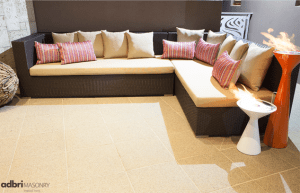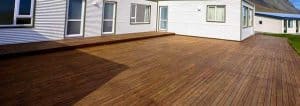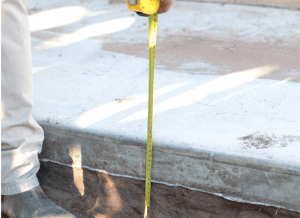DECK VS PAVERS VS CONCRETE SLAB | PATIOS
Select the right building material for your new patio
“Which type of building material should I choose for my patio?” It’s a commonly asked question and one that has a bit of a tricky answer given there is a myriad of options within each category. To help you make the best choice for your project, we’ve complied a handy list of pros and cons of the most popular building materials for patio construction, i.e. deck vs pavers vs concrete.
SOME IMPORTANT THINGS TO CONSIDER WHEN SELECTING YOUR MATERIAL:
- The cost – what price is the product and associated building/construction costs.
- Your land – have you got flat or slopped land?
- Maintenance – the time it will take you to maintain the patio material and costs associated with cleaning products for the lifetime of the patio.
- Potential permits – do you need council approval and certification to build your patio? (consider cost and time here)
If you’ve already sourced your quotes, remember to consider the associated maintenance cost of the product over it’s lifetime rather than looking at the initial upfront price of the product, as well as the total lifespan of the product – how quickly will it deteriorate in comparison to others?
Pros & Cons – Deck vs Pavers vs Concrete
Pavers

PROS
• Budget friendly options at any price point:
The price varies depending on your choice; can opt for small budget pavers, or large faced premium textures.
• Little to no maintenance is required if pavers are sealed when installed:
Some sealers even come with a 15-year stain resistance warranty. Concrete pavers, by virtue of being concrete have a very long product life.
• Not prone to rotting or white ants
• Suitable for all aesthetics:
With nearly endless size, shape, colour and texture options to suit your house style, colour theme and budget.
• Most concrete pavers (and ALL Adbri Masonry pavers) have a high slip resistance with very low risk of slipping when wet
• No Building Permits or council approval required
• Harmonise colours with your house and garden:
Most manufactures will make garden edge or retaining wall products with same colour and texture options, so you can match your whole garden and backyard landscaping.
• Suitable for those who want to take the DIY challenge!
• Reduced maintenance costs:
If one paver breaks, you can easily replace just the one broken one.
CONS
• Often will require some excavation to put in base materials:
You can save some labour costs by doing this yourself. Remember; when excavating always call ‘dial before you dig’ – phone 1100 to locate underground services.
• Labor intensive:
Concrete pavers can be heavy in larger sizes and the construction, and while not overly technical or difficult, is labour intensive.
• Best suited to flat land
• Chance of efflorescence:
Excess moisture on unsealed pavements can lead to visible, temporary efflorescence markings on the paver surface and while easy to remove, can be an additional cost. Learn how to remove efflorescence HERE.
Deck

PROS
• Good for uneven terrains, sloped land or building high off the ground
• Budget friendly:
The price varies depending on your choice; basic timber will be cheaper than a merbau.
• Building ‘up’ means little need for excavation:
Though you will need to dig holes for the post footings – Remember; when excavating always call ‘dial before you dig’ – phone 1100 to locate underground services.
• Can stain the wood to match your house or desired aesthetics
• Comfortable in heat:
If you live in a warm climate, wooden decks will naturally retain less heat.
• Smaller decks constructed atop of even ground can be DIY friendly
CONS
• Will often need a building permit and certification:
Requires additional fees and time
• Untreated and un-maintained timber is prone to rotting
• Attracts white ants
• Can require significant expense and time required for maintenance:
Subject to the desired aesthetic of your deck, it may need to be sanded and will need to be stained/sealed every couple of years.
• May have point load weight restrictions:
Be mindful of hot tubs or outdoor kitchens on elevated decks supported by post footings, (generally engineer drawings will accommodate this).
Concrete Slab

PROS
• Generally, the cheapest material costs of all three options:
Labour hire will take up most of the costs
• Suitable for all aesthetics:
Many colour and texture options to suit your house style, colour theme and budget.
• Very little maintenance required over time:
Can often look renewed with a simple wash with a high pressure water cleaner.
CONS
• Can be a challenging DIY project:
With considerations around level finishes that allow water to fall off the surface.
• Site access can often be an issue:
You need the agitator to get close to the area. A concrete pump is an additional expense or many loads back and forth with the wheel barrow.
• Best suited to even grounds
• Can be prone to cracking over time:
This can present maintenance issues, as opposed to one paver or one wood plank needing to be replaced.
Get started on your project!
Learn how to DIY your own paved courtyard with Better Homes and Gardens landscape expert, Jason Hodges below – OR see our extensive range of paving options to suit all budgets and styles HERE.
If you have any questions about your project, get in touch with our team on 1300 230 633 or check out our social media pages for more masonry inspiration.